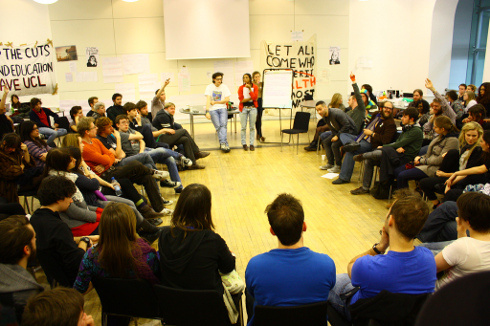Reclaim the Power aims to be a horizontal organisation. What this means, in simple terms, is that we don’t have any leaders or managers. Instead, it is open to everyone to join in and contribute. Responsibility for decisions, and making them happen, is completely shared by participants.
Join a local group
Reclaim the Power has groups or contacts in Manchester, Leeds, Bristol, Oxford, Lancashire, Nottingham, Brighton and London. To find out out when these groups next meet check out our Facebook page or contact info@reclaimthepower.org.uk.
Come to a Gathering
We organise two day national gatherings to make collective decisions. These are held at different towns and cities across the country. We use them to make important decisions, but they also serve as important spaces for learning, developing skills and getting to know people.
All our gatherings provide crash space, childcare, and cheap and vegan food. All our meeting venues are wheelchair accessible.
We try to make our gatherings as inclusive as possible for newcomers, including the use of a friendly buddying system, so don’t worry if you’ve never been to anything like this before!
Find out details of our next gathering here or check out the Facebook page.
Join a Working Group
Much of Reclaim the Power’s work takes place in smaller working groups, which we have listed below. Our working groups are open to all to join, regardless of pre-existing skills – as part of the role of working groups is to train and skill new people.
The best way to join a working group is to come along to a gathering where working groups are given time to meet. However, you can also email them to find out more.
Here are the working groups that we currently have:
Infrastructure Group
Responsible for delivering a safe, sustainable, accessible, and beautiful site for Reclaim the Power’s summer camp. This is a massive job including, but not limited to, toilet facilities; plumbing; marquees; recycling; renewable energy; kitchens; and transport.
email: infrastructure@reclaimthepower.org.uk
Gatherings and Facilitation Group
The Gatherings and Facilitation Group are responsible for the organising national gatherings, including drafting agendas and minutes. They aim to constantly improve these events so that they’re inspirational and inclusive to all participants – at the same time as keeping them realistic and directional. We try to experiment with new methods of facilitating discussion and decision-making. The group also takes responsibility for continually training and rotating facilitators.
This group has responsibility for Reclaim the Power’s internal communications and democratic participation at Reclaim the Power events.
email: info@reclaimthepower.org.uk
Anti-oppression and Movement Building Group
Reclaim the Power has committed itself to anti-oppression work. This working group exists to address the ways in which Reclaim the Power’s activities currently exclude people, seeking to propose actions we can take to address these issues. It also exists to to make Reclaim the Power more effective at movement building.
email: anti-oppression@reclaimthepower.org.uk
Participation Group
This group aims to increase participation in Reclaim the Power events and actions through a range of outreach and solidarity activities. They seek to increase the diversity of Reclaim the Power events through linking up with a wide range of groups and communities. They also have responsibility for producing Reclaim the Power’s publicity materials. This group also manages this website and Reclaim the Power’s social media platforms Facebook and Twitter accounts.
email: participation@reclaimthepower.org.uk
Media Group
Responsible for pushing Reclaim the Power’s key messages through the mainstream and alternative press, and also for training a diverse range of voices to speak with the press as individuals or on behalf of the network.
email: press@reclaimthepower.org.uk
Finance
Oversees the finances of Reclaim the Power’s activities.
email: finance@reclaimthepower.org.uk
 Consensus Decision Making
Consensus Decision Making
Reclaim the Power uses consensus decision making in all its gatherings, working group meetings, and events. Consensus decision making seeks to find solutions that everyone is happy with (or at least can live). It is an alternative to majority voting that privileges the view of the majority.
Consensus is not a new concept. On the American continent non-hierarchical societies have existed for hundreds of years. The business meetings of the Religious Society of Friends (Quakers) use a form of consensus decision making. Finally, political and social activists have made use of consensus decision making in recent years; the Camp for Climate Action Camps across the globe and Occupy being just two examples.
If you haven’t used consensus decision-making before, don’t panic! We fully explain how it works at every gathering, and offer additional support (like a buddy) should you wish for it.
You can read Seeds for Change’s guide to consensus decision making here.

